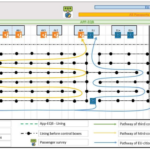Europol is to be allowed to carry out “discreet” manhunts and request large amounts of data from private companies, using “artificial intelligence”. In addition, the police agency coordinates special units and cooperated with foreign secret services.
The European Parliament, the Commission and the Council today began the so-called trilogue procedure for a new Europol regulation. The police agency with its headquarters in The Hague could receive significantly more competences. It is stipulated, for example, that Europol coordinates the special police units of the member states in the ATLAS network, reports any criminal conduct within Europol’s competence to the European Public Prosecutor’s Office and supports the member states in responding to cyber attacks.
A corresponding proposal to amend the current regulation was presented by the Commission last December. The main changes are named in the title of the legislative text: It is about Europol’s cooperation with private parties, the increased processing of personal data and the role in research and innovation.
Contact point for “Big Data”
The last point is probably the least controversial. Europol has already set up an “Innovation Laboratory”, which is now to be strengthened. This concerns new technologies such as the interception of 5G communications or access to encrypted communications. Europol is also to be allowed to process personal data held in its databases for research and innovation purposes. In this way, “artificial intelligence” techniques could also be tested. According to the proposal, Europol should play a “key role” in supporting the member states in this regard.
Before the summer break, the governments of the member states in the Council, then still under the Portuguese Presidency, had decided on their mandate for the negotiations. The mandate reaffirmed Europol’s contribution to technologies based on “artificial intelligence”. The Council position also focuses on access to personal data at internet service providers, which is to be handed over for criminal investigations. Europol is to become a focal point for receiving this data and then analysing it itself with “big data” applications.
The agency has made clear where this leads in the investigations into the encrypted telephone networks “EnchroChat” and “Sky ECC” as well as the cover company “ANOM” founded by the FBI. Europol has set up joint investigation teams for this purpose and, according to its own information, has received, processed and distributed “hundreds of millions of messages” to member states. The former head of internet investigations of the French gendarmerie, who has now become one of Europol’s deputy executive directors, is responsible for this.
Agreements with Turkey and Israel
The Council also wants to expand cooperation with “important third countries” and thus goes beyond the Commission’s proposal. Europol itself is to assess whether data protection is guaranteed in these countries. Corresponding agreements are planned with Turkey and Israel, for example.
With an overwhelming majority, the EU Parliament also defined its negotiating position for the future of Europol last week. While the use of “artificial intelligence” by police and judicial authorities was clearly criticised in an earlier resolution, MEPs have no reservations about this with regard to Europol. As a condition, the mandate merely states that the use should take place “in full respect for fundamental rights and freedoms, including non-discrimination”.
Parliament, the Council and the Commission are largely in agreement on the new Europol Regulation. According to the Minister of the Interior of Slovenia, which currently holds the Presidency of the Council, negotiations are expected to be concluded this year.
Thousands of data records from the Western Balkans, North Africa and the USA
The situation is different with the regulation on the Schengen Information System (SIS II), which also needs to be renewed. This is necessary because in future Europol itself is to issue alerts in this largest European police database. Last week, the MEPs had issued their mandate to start negotiations on this issue, and shortly before, the Council had also decided on this.
Alerts that Europol enters in the SIS II are to come from police forces and secret services from third countries. This is already being practised in the area of “Islamist terrorism”, and the member states and Europol have agreed on a procedure that has so far been voluntary. Several thousand data sets come from authorities in the Western Balkans, North Africa and the U.S. police and secret service organisation FBI.
However, the persons on whom alerts have been issued are not to be arrested or banned from entering the European Union. Instead, they are registered under Article 36 of the current SIS II Regulation. With these so-called covert searches, the persons concerned can be tracked “discreetly”. The issuing authority then receives notification of where and with whom the person was encountered by another authority. Currently, around 162,000 people are secretly tracked in this way throughout the Schengen area.
A “European FBI” contradicts EU treaties
It is disputed whether Europol may actually carry out the searches itself or whether it must always find a willing member state to do so. In any case, such a new alert category will be set up in the SIS II to notify Europol. According to the plans of the Commission and the Council, the entries could also contain facial images, fingerprints and DNA data.
The new competences strengthen above all the Counter-Terrorism Centre at Europol. According to the German Social Democratic Party (SPD), the police agency should become a “European FBI”, as the SPD interior minister of Lower Saxony, Boris Pistorius, had already demanded last year. In the meantime, the Greens, the Liberals (FDP) and the Christian Democrats (CDU) have joined this chorus of hardliners.
However, this would require a complete reorganisation of the European Union, as EU Commissioner for Home Affairs Ylva Johansson recently confirmed. For the Treaty on the Functioning of the European Union “provides that Europol cannot be a European FBI” and to use coercive measures, for example. According to the Commission, Europol’s main task is exclusively “to support and strengthen national law enforcement”.
All future German government parties plus the CDU want a “European FBI”, which, according to the Treaty on the Functioning of the European Union, should not even exist (U.S. Army Materiel Command, CC-BY 2.0).





Leave a Reply